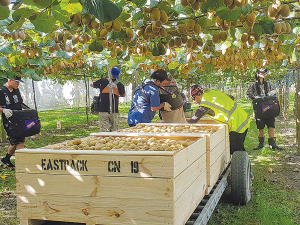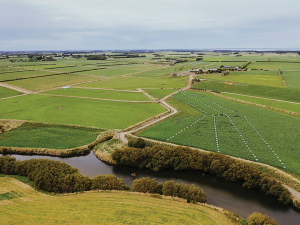New Zealand horticulture exports reached a record-breaking $6.2 billion in the year ending June 2019 – an increase of $720 million on the previous year.
The sector earned more than 10% of New Zealand’s total merchandise export income last year.
According to latest edition of Fresh Facts, published annually by Plant & Food Research and Horticulture New Zealand, the total NZ horticulture industry was valued at $9.5 billion in 2019.
Fresh fruit exports topped $3.4 billion of this total – up by $54 million since 2018.
Kiwifruit continues to be New Zealand’s largest fresh fruit export, valued at $2.3 billion in 2019. More than 545,800 tonnes of kiwifruit exports were sent overseas, two thirds of this to Asian countries. Apples were the second largest fresh fruit export, earning $829 million. New Zealand-bred varieties such as Jazz, Envy and Pacific brand apples are popular with overseas consumers and made up a quarter of apple exports.
New Zealand supplied wine to 100 countries in 2019 earning more than $1.8 billion. More than 80% of NZ wine exports went to the USA, UK, Australia and Canada.
Notable vegetable exports include onions which had a $170.3 million export value in 2019, more than half supplied to European markets. Some $129.4 million of potatoes were exported, mostly in processed form for the Australian market.
New Zealand horticultural produce was exported to 130 countries in 2019.
The top five markets were Continental Europe, Australia, the USA, China and Japan. Exports to Asia were $2.6 billion, 42% of total NZ horticulture exports.
“A reputation for high quality fruits and vegetables produced using environmentally sustainable practices, in addition to well established trade routes, are vital for the New Zealand horticulture industry,” says David Hughes, chief executive, Plant & Food Research.
“The horticulture industry experienced another year of substantial growth in 2019, thanks to the innovation and expertise of our growers and exporters. It is this innovation and expertise that will enable our industry to adapt successfully to the challenges that COVID-19 is bringing.
“At the same time, COVID-19 will offer our industry opportunities, particularly in terms of likely increased export demand for our fresh, healthy produce,” says Mike Chapman, chief executive of Horticulture New Zealand.
“With that in mind, I remain positive about the future prosperity of our industry on the basis that container supply, regular shipping and markets remain open to our produce.
The re-opening of restaurants in New Zealand and in our overseas markets is needed to ensure that we have all outlets that use our produce open and operating.”
Key facts
• Produce from the New Zealand horticultural sector was worth $9.5 billion in the year to 30 June 2019.
• The total value of horticultural exports was $6.2 billion in 2019, $720 million more than in 2018.
• The biggest horticultural export was kiwifruit ($2.3 billion). Other key exports were wine ($1.8 billion), apples ($828.8 million), and onions ($170.3 million).
• Exports to five markets , Continental Europe, Australia, the USA, China and Japan, accounted for almost $4.7 billion and 76% of the total exports.











